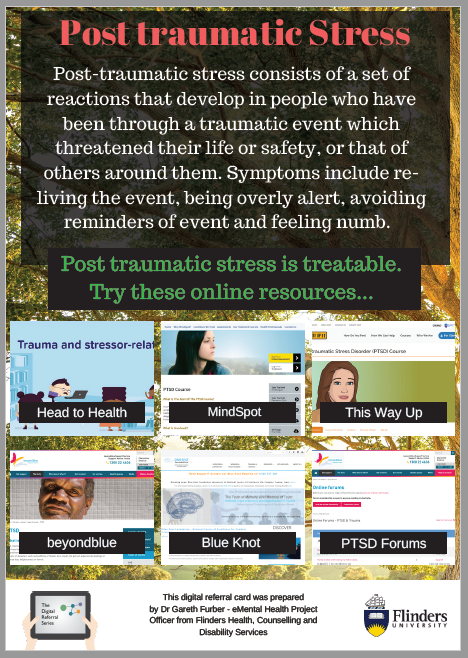
It is an unfortunate fact of life that most of us, at some point, will be exposed to a traumatic event.
Examples of traumatic events include:
- death of family member, partner, friend, mentor or pet
- divorce
- physical pain or injury (e.g. car accident)
- serious illness
- war or torture
- natural disasters
- terrorism
- moving to a new location
- child abuse
- parental abandonment
- witnessing a death
- sexual assault
- domestic abuse
- prison stay
How people react to traumatic events differs across individuals, cultures, and the nature of the event itself, but it is common for people to experience fear, helplessness or horror during the event, shock following the event, followed by a range of different emotions: denial, sadness, grief, irritability, anxiety, anger and fear.
As people deal with these feelings and the changes brought to their life as a result of the event they might also experience flashbacks, memories, altered sleep, changes in appetite, withdrawal from everyday activities, physical symptoms (e.g. headaches) and difficulty concentrating.
It is important to note that these reactions are normal and part of the coping process. They are not indicative of mental illness or disorder.
For some people however, they can find it difficult to adjust after a traumatic event, and develop post-traumatic stress.
Post-traumatic stress and post-traumatic stress disorder (PTSD) describe a particular set of reactions that develop in some people who have been through a traumatic event. These reactions signal that the individuals coping resources are overloaded and that they might benefit from some assistance.
Post-traumatic stress is characterized by 4 different clusters of symptoms:
Re-living the traumatic event through memories, flashbacks, and nightmares, often accompanied by intense feelings, physical reactions (e.g. sweating, palpitations) and feelings of being back in the event.
Being overly alert, wound up, or stressed out.
Actively avoiding any activities, places, people, thoughts or feelings associated with the event, because of it triggering memories.
Feeling emotionally numb, cut off, or detached from friends, family, and day-to-day activities
These symptoms can make everyday life very difficult, and those who experience them typically report they interfere with their functioning across multiple domains: family, friends, work, leisure.
If you suspect that you might be experiencing post-traumatic stress, there are a number of online services that might be helpful. They are captured in the attached pdf. You might also choose to share this post with a friend, family member or colleague if you suspect they are struggling following a traumatic event.
Also remember that for Flinders University students, you have the counselling service, as well as the post-traumatic stress research unit.


